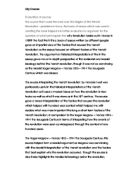Why did Khrushchev do it?
- Several possible reasons:
- Wished to liberate the party officials from the fear of repression, as under Stalin, no one was safe to voice an opinion that conflicted to his.
- A strategic maneuver on the part of Khrushchev, with the goal of securing his own authority. By denouncing Stalin, Khrushchev was also undermining the credibility of his competitors, namely Molotov and Malenkov, who had been members of Stalin’s inner circle. This gave them an ultimatum: side with Khrushchev or be condemned along with Stalin
- Truly wished to change the coarse of the development of the Soviet Union
The events that followed
- Throughout the 1950’s, Khrushchev’s policy of Desalinization continued, with many new policies constructed that greatly deviated from the past Stalinist approach.
- The SU’s approach to agriculture was completely different then under Stalin, putting collectivization on the backburner and implementing an entirely new agricultural policy, the Virgin land schemes. Under this, previously unused or abandoned land would be predominantly farmed, even in distant areas such as Siberia and Kazakhstan.
- Khrushchev’s social policy saw a dramatic shift from that of Stalin’s, with Khrushchev increasing the real wages of the Soviet Union by a notable 4.1%. Social benefits were also present under Khrushchev, something virtually unheard of under Stalin, with the government offering holiday pay, medical care, housing, pensions and schooling. Much of the strict legislation that characterized the Stalinist era was also relaxed, with the introduction of a seven-hour day and harsh punishments for absenteeism abolished.
- Khrushchev cultural policy marked a significant shift from that of Stalin. Generally Khrushchev was more lenient on free cultural expression then Stalin, but still had periods of significant repression. Importantly, Khrushchev subtly encouraged artists and writers to criticize Stalin in their works, adding to the general aura of Desalinization that was prevalent throughout the decade.
- Desalinization, as a policy, constantly fluctuated in its intensity, linked closely to the current political and economic situations.
- In 1961, Desalinization reached its culmination, when, at the twenty-second party congress, Khrushchev gave a considerably more direct and public condemnation of Stalin, blaming him both for the German attack of 1941 and his general inept leadership. The members of the Anti-party group were publicly identified, and, symbolically, Stalin was removed from the Lenin-Stalin mausoleum, signifying Khrushchev intent to promote only Lenin as a figurehead of communist authority. In the same year Stalingrad was renamed Volgograd.
- As Khrushchev continued his ‘desalinization campaign, he alienated more and more of the high level party members who did not agree with what he was doing. Eventually, this was one of the key factors that caused him to lose control of the Soviet Union in 1964.
Historiography
“Destalinisation was a stop-go policy, closely linked to events in other policy areas” – Martin McCauley







